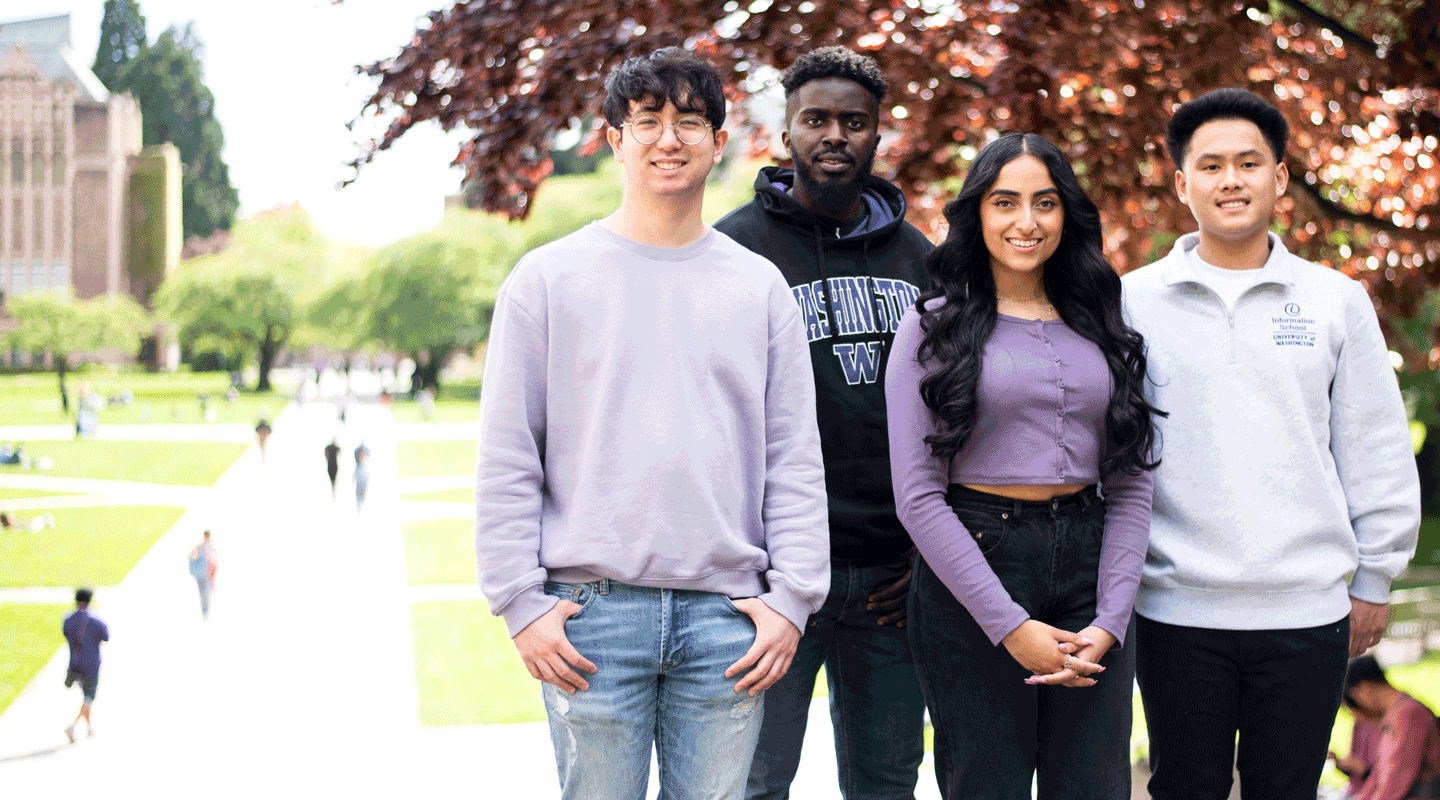CuriosityBased, a Seattle company, is dedicated to improving workplaces by helping build trust and collaboration among coworkers. One of the key ways it does that is through its “7 Forms of Respect” assessments. The results can help colleagues understand how to work together more effectively.
But taking the results and putting them into an understandable form was a long, tedious process. It was too much for a company with only two full-time employees.
Now, thanks to iSchool students working with CuriosityBased, work that used to take about 20 minutes takes less than a minute.
This year, four students took on the project as their Capstone, which is a chance for iSchool students to put their skills to work on a real-world problem. It was the second year that CuriosityBased had worked with a Capstone team.
The members of this year’s team, (pictured, from left) Skyler Yesiltepe, Ghislain Bugingo, Kaamna Rishi and Bryan Phan, are all Informatics students. The project attracted the team because it was a chance to solve a problem for a company whose work they believed in.
“What kept us going was helping CuriosityBased; they have such a great mission,” Rishi said. “CuriosityBased helps organizations and people understand themselves better, professionally and personally.”
Last year, CuriosityBased worked with a group of iSchool students who helped them improve the process for the “7 Forms of Respect,” taking it from about 20 minutes to five. This year, the company was ready to grow more and was looking to improve the process further.
This year’s team worked with Julie Pham, CuriosityBased founder and CEO, and Hnin Johnson, project manager, to take the next step.
The team talked extensively with Pham and Johnson to understand what the company’s challenges and hopes were. They also worked with Joyce Elauria, an iSchool graduate who worked on the project last year. CuriosityBased paid her an honorarium to provide technical support.
The tool created by the first year’s Capstone team, which included Elauria, used Microsoft Forms and Python to collect the data and then process it to create a PDF for customers.
This year, CuriosityBased wanted to take it further and free up more of Johnson’s time. The company also wanted to create a way for CuriosityBased to easily monetize its assessment. It needed a simple solution that wouldn’t require a lot of technical expertise.
“In a lot of classroom environments, we were told what to use,” Yesiltepe said. “In this case, we had to figure it out on our own.”
The team discovered that a Google tool that was completely new to them could do what they needed. They used Google Forms combined with Apps Script. Figuring that out was exciting and gave them a lot of energy to move forward.
While finding the right technology was key to the project, it wasn’t the whole picture.
“The iSchool is about information,” Bugingo said. “It’s not about the tech or the tools. It’s about the bigger picture and planning and research and understanding the problem.”
The team appreciated being able to work from start to finish on a project where they could see the real-world results.
“It was satisfying getting multiple quarters to work on this project,” Phan said. “Now, as we’re getting to the end, we can see our impact we had as a team. And we can see how we developed and improved.”
Elauria, who graduated in 2021, was interested to see how quickly technology had changed and how easily the students were able to figure it out. But working with the students was the highlight.
“Mentorship is very important to me,” she said. “It was a passing of the torch, and it was cool to see that happen.”
Johnson also said that working with the team was a highlight of the project. As an immigrant, she found it rewarding to work with such a diverse team, including students from immigrant families.
“Working with them was inspiring,” she said. “They helped us solve problems with tech, but I also feel like they are well rounded. They know how to work with people from diverse cultures. We connected and related with each other. They definitely have soft skills. And they will just get better going forward, with that and their tech skills.”
Pham said she admired the team’s professionalism — and she enjoyed seeing how eager they were to find a solution.
“There was a joy in trying to solve the problem,” she said. “They seemed excited for problems, not annoyed by solving something. There was an appreciation that in the real world they would have to solve problems. They approached it as a learning opportunity and not just as something they that they have to do.”
